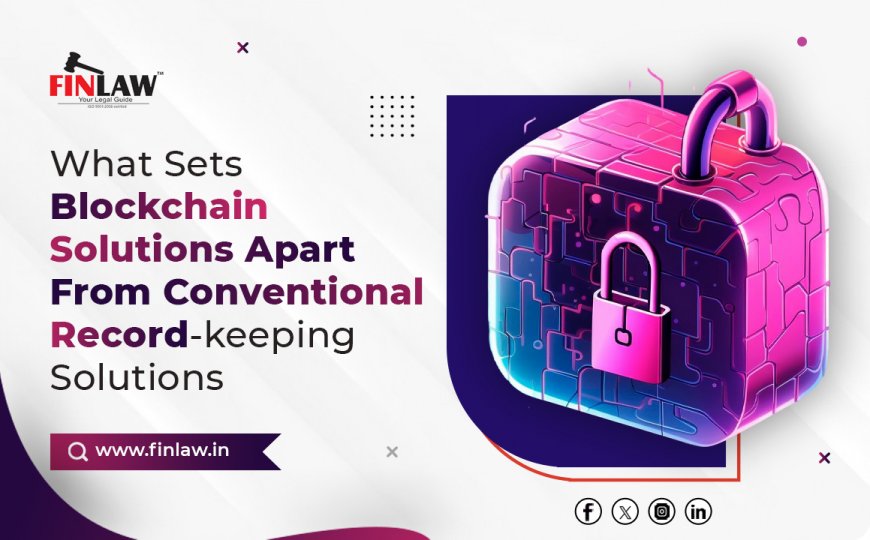What Sets Blockchain Solutions Apart from Conventional Record-Keeping Solutions?
Discover how blockchain solutions outperform conventional record-keeping with enhanced security, transparency, and efficiency in India.

In a world where data is the new oil, the systems we use to store, verify, and manage this data are more critical than ever. Businesses, governments, and individuals rely on record-keeping solutions for everything from financial transactions to healthcare data and land ownership. While conventional record-keeping has long been the standard, a new player—blockchain solutions—is disrupting this status quo.
India, as a rapidly digitizing economy, is witnessing a growing interest in blockchain-based record management. But what makes blockchain solutions stand out when compared to conventional record-keeping systems? Let’s explore this transformative technology and why it's gaining traction across sectors in India.
What Is Conventional Record-Keeping?
Conventional record-keeping refers to traditional systems used to store, retrieve, and manage data—either on paper or through centralized digital databases. Examples include physical ledgers, Microsoft Excel spreadsheets, Enterprise Resource Planning (ERP) software, and centralized databases managed by banks or government agencies.
Key Features of Conventional Record-Keeping Systems:
-
Centralized Storage: Managed by a single authority or organization.
-
Manual Processes: Requires human involvement for data entry and verification.
-
Limited Accessibility: Only certain parties can access or verify data.
-
Vulnerability to Manipulation: Data can be altered, lost, or deleted.
-
Security Risks: Susceptible to data breaches, hacking, and unauthorized access.
What Are Blockchain Solutions?
Blockchain solutions are digital, decentralized record-keeping systems that use distributed ledger technology (DLT). In a blockchain, data is stored in blocks that are cryptographically secured and linked in a chronological chain. This system ensures transparency, immutability, and decentralized control.
Core Features of Blockchain-Based Record-Keeping Solutions:
-
Decentralized Network: No single point of control or failure.
-
Immutability: Once added, records cannot be changed or deleted.
-
Automated with Smart Contracts: Self-executing contracts reduce manual intervention.
-
Real-Time Auditing: Instant verification and tracking of transactions.
-
Enhanced Data Integrity: Tamper-proof and transparent for all stakeholders.
Blockchain vs. Conventional Record-Keeping: A Detailed Comparison
|
Feature |
Conventional Record-Keeping |
Blockchain Solutions |
|
Data Storage |
Centralized servers or physical files |
Distributed ledger across multiple nodes |
|
Access Control |
Restricted to internal users |
Permissioned or public depending on the use case |
|
Audit Trails |
Maintained manually |
Real-time and automatic |
|
Fraud Prevention |
Limited; dependent on human oversight |
Built-in via consensus algorithms |
|
Efficiency |
Often slow and error-prone |
Automated and fast through smart contracts |
|
Cost |
High due to intermediaries |
Lower by removing intermediaries |
|
Transparency |
Limited and delayed |
Immediate and verifiable by all parties |
Applications of Blockchain Solutions in India
India is already seeing blockchain adoption in various sectors, replacing legacy record-keeping solutions with more transparent and efficient systems.
1. Land Records and Property Registration
The Department of Land Resources, under the Ministry of Rural Development, is exploring blockchain to digitize land records. States like Andhra Pradesh, Telangana, and Maharashtra have pilot projects where land ownership records are maintained on blockchain platforms. This reduces land disputes and ensures verifiability.
2. Healthcare and Patient Records
In partnership with tech companies and state governments, India is building blockchain-based Electronic Health Records (EHR) systems that ensure privacy and portability. For instance, the National Health Authority is experimenting with blockchain for Ayushman Bharat Digital Mission (ABDM) data storage.
3. Supply Chain and Logistics
The Food Corporation of India (FCI) and private logistics firms are piloting blockchain systems to manage the movement of grains, pharmaceuticals, and vaccines. These systems improve traceability and minimize wastage due to better record-keeping solutions.
4. Academic Credentials and Certificates
Universities like the Indian Institute of Technology (IIT) Kanpur and the Central Board of Secondary Education (CBSE) are issuing digital certificates and degrees on blockchain to prevent forgery and simplify verification.
5. Public Governance and Legal Documentation
The Firozabad Police Department in Uttar Pradesh became the first in India to implement a blockchain-based grievance redressal system, ensuring that lodged complaints remain tamper-proof and transparent.
Why Businesses in India Should Consider Blockchain Record-Keeping Solutions
1. Regulatory Compliance Made Easier
With GST, financial audits, and SEBI reporting becoming more stringent, blockchain provides a real-time and immutable audit trail that simplifies compliance.
2. Reduced Operational Costs
By removing intermediaries and automating record management processes, businesses can drastically cut administrative expenses.
3. Enhanced Data Security
As data privacy laws like the Digital Personal Data Protection Act (2023) come into effect, blockchain provides encrypted and access-controlled data storage options.
4. Trust and Transparency with Stakeholders
Whether it's vendors, customers, or government regulators, blockchain ensures that data is transparent and trustworthy, enhancing the organization’s credibility.
Challenges in Adopting Blockchain in Record-Keeping
While blockchain holds promise, it's not without its limitations:
-
Technical Complexity: Requires significant investment in training and infrastructure.
-
Legal and Regulatory Ambiguity: India is still evolving its stance on blockchain and crypto-related frameworks.
-
Scalability Issues: Public blockchains like Ethereum may suffer from high transaction costs and latency.
-
Integration with Legacy Systems: Transitioning from conventional systems can be cumbersome and risky.
The Future of Record-Keeping in India: Blockchain as the New Normal?
With Digital India and emerging frameworks like the IndiaStack ecosystem, blockchain solutions are likely to be integrated into more public services, such as voting systems, tax collection, and social welfare schemes.
NITI Aayog has already released multiple papers exploring blockchain's potential in governance, and the Reserve Bank of India’s Digital Rupee launch signals institutional confidence in the technology.
Key takeaway: Conventional systems may remain relevant for basic data management, but for trust-critical applications, blockchain will be the preferred record-keeping solution in India’s digital economy.
Final Thoughts
The shift from conventional record-keeping to blockchain solutions represents a fundamental transformation in how data is managed, verified, and secured. For Indian organizations looking to future-proof their operations, investing in blockchain-based record-keeping solutions is more than a trend—it’s a strategic necessity.
Whether you’re a business owner, policymaker, or IT leader, understanding the strengths and limitations of both systems is essential. As blockchain technology matures and regulations evolve, the adoption of decentralized record-keeping in India is poised to accelerate.
What's Your Reaction?



















